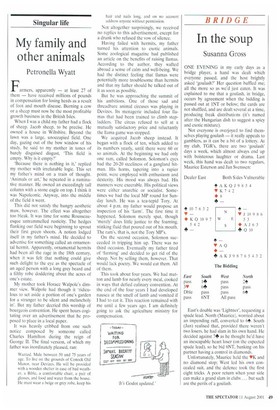Singular life
My family and other animals
Petronella Wyatt
Farmers, apparently — at least 27 of them — have received millions of pounds in compensation for losing herds as a result of foot and mouth disease. Burning a cow or a sheep must now be the most profitable growth business in the British Isles.
When I was a child my father had a flock of sheep. Jacob sheep, to be precise. He owned a house in Wiltshire. Beyond the lawn was a large, unoccupied field. One day, gazing out of the bow window of his study, he said to my mother in tones of barely disguised disgust. 'This field is empty. Why is it empty?'
'Because there is nothing in it,' replied my mother with irrefutable logic. This set my father's mind on a train of thought. 'Animals or art,' he repeated in a ruminative manner. He owned an exceedingly tall column with a stone eagle on top. I think it was Napoleonic. Anyway, into the middle of the field it went.
This did not satisfy the hungry aesthetic maw, however. The effect was altogether too bleak. It was time for some Rousseauesque untrammelled rusticity. The hedges flanking our field were beginning to sprout their first green shoots. A notion lodged itself in my father's mind. He decided to advertise for something called an ornamental hermit. Apparently, ornamental hermits had been all the rage in the 18th century, when it was felt that nothing could give such delight to the eye as the spectacle of an aged person with a long grey beard and a filthy robe doddering about the acres of one's estate.
My mother took Horace Walpole's dimmer view. Walpole had though it "ridiculous to set aside a portion of one's garden for a stranger to be silent and melancholy in'. But my father decried this worship of bourgeois convention. He spent hours cogitating over an advertisement that he proposed to place in a local paper.
It was heavily cribbed from one such notice composed by someone called Charles Hamilton during the reign of George II. The final version, of which my father was inordinately pleased, ran:
Wanted. Male between 50 and 75 years of age. To live on the grounds of Conock Old Manor, near Devizes. He will be provided with a wooden shelter in case of bad weather, a Bible, a comfortable chair, a pair of glasses, and food and water from the house. He must wear a beige or grey robe, keep his hair and nails long, and on no account address anyone without permission.
Not altogether surprisingly, we received no replies to this advertisement, except for a drunk who refused the vow of silence.
Having failed with hermits, my father turned his attention to exotic animals. Some zoological magazine had published an article on the benefits of raising llamas. According to the author, they wafted abroad a sense of calm and well-being. We had the distinct feeling that llamas were potentially more troublesome than hermits and that my father should be talked out of it as soon as possible.
But he was approaching the summit of his ambitions. One of those sad and threadbare animal circuses was playing in Devizes. Its menagerie included four llamas that had been trained to climb stepladders. The circus refused to sell at a mutually satisfactory price and reluctantly the llama game was stopped.
We acquired Jacob sheep instead. It began with a flock of ten, which added to its numbers yearly, until there were 60 or so animals. At the beginning we had only one ram, called Solomon. Solomon's eyes had the 20-20 steeliness of a gangland hitman. His horns, tapering into a rapier point, were employed with enthusiasm and dexterity. His mood was always bad. His manners were execrable. His political views were either anarchic or socialist. Sometimes we had the local MP round for Sunday lunch, He was a tea-tepid Tory. At about 4 p.m. my father would propose an inspection of his 'farm'. The first time it happened, Solomon merely spat, though 'merely' does little justice to the foaming, stinking fluid that poured out of his mouth. The ram's, that is, not the Tory MP's.
On the second occasion, Solomon succeeded in tripping him up. There was no third occasion. Eventually my father tired of 'farming' and decided to get rid of the sheep. Not by selling them, however. That would lack poetry. We would eat them. All of them.
This took about four years. We had mutton and lamb for nearly every meal, cooked in ways that defied culinary convention. At the end of the four years I had developed nausea at the smell of lamb and vomited if I had to eat it. This reaction remained with me until a few years ago. I am definitely going to ask the agriculture ministry for compensation.


























































 Previous page
Previous page